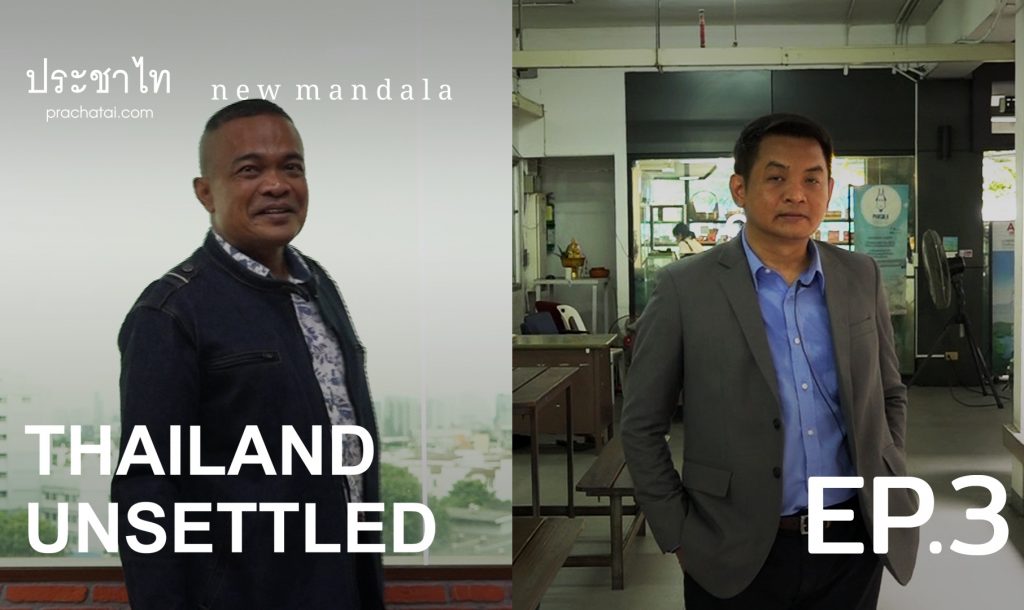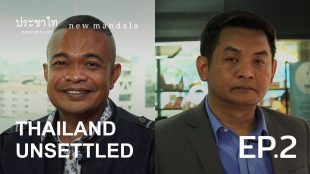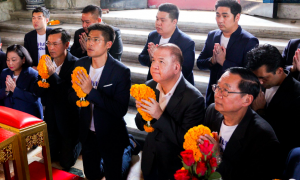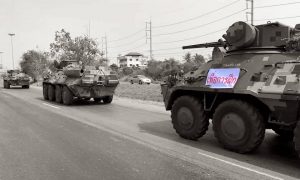The episode
Continuing on from their discussion on reconciliation in Episode 2, red-shirt leader Jatuporn Prompan and former yellow-shirt leader Suriyasai Katasila agree—pessimistically—that Thailand’s coming elections are merely one stage in a long cycle of political instability that threatens to lead back to military intervention. Where the pair clash, however, are the sources to which they attribute this deadlock. For Suriyasai, the problem can be summed up in the name “Thaksin Shinawatra”, and the divisions the man inflames in Thai society. For Jatuporn, the junta has designed a constitution that sets the post-election government up for failure.
The guests
Red-shirt leader Jatuporn Prompan is the current chairman of the United Front for Democracy Against Dictatorship (UDD) and a key figure backing the Pheu Chart party competing in Thailand’s 2019 elections. Jatuporn gave this interview the week after his release from a year-long term in prison for allegedly defaming former prime minister Abhisit Vejjajiva (in a speech delivered to protesters in 2010, Jatuporn accused Abhisit of ordering the killing of civilians).
Suriyasai Katasila previously coordinated yellow-shirt People’s Alliance for Democracy (PAD) protests and was a leader of the People’s Democratic Reform Committee (PDRC). More recently, he has been active along with a number of other PDRC leaders in founding the pro-establishment Action Coalition of Thailand Party (ACT), supported by Suthep Thaugsuban. Last month, Suriyasai was imprisoned for breaking into Government House in 2008 as part of PAD protests against the Samak Sundaravej government.
Transcript
Going forward [post-election], what issues will define political divisions in Thailand?
Suriyasai: The main issue continues to revolve around acceptance or rejection of Thaksin Shinawatra. This remains the issue [that causes political divisions]. Because it’s undeniable that Thaksin continues to be politically influential. Today, it remains clear that Pheu Thai is Thaksin and his family’s party. Thaksin is still able to command it.
Whenever Thaksin establishes a stance, there are inevitably both people who agree and disagree—that cannot be avoided. It still evolves into a kind of inescapable political polarisation which drags down attempts to make politics about policy, reconciliation and reform.
Some people say that I’m haunted by the ghost of Thaksin. That’s not true. Thaksin isn’t a ghost. He’s still exercises great political power, enough to influence the course of Thai politics. Even Nattawut [Saikua, the red-shirt leader] has said that Pheu Thai would implode without Thaksin. He said it himself; it’s clear as day. I don’t think that political analysis is rocket science. Politics is still about the divide between those who support and those who reject Thaksin.
I feel it will be this way even after elections, or this round of elections. Whether one likes it or not, this game is inescapable, because Thaksin designed it and fixed in place. We’ve been stuck it in for ten years. These days, many political parties try to speak of political reform, reconciliation and national strategy. And I do agree that we should try to exit this game—but for now, that’s still impossible. It’s impossible. There are some people who do not want the game to be over.
If Thaksin is the problem that plagues Thai politics, what should ideally be done about his continued influence?
Suriyasai: It’s difficult. I think even Pheu Thai struggles with this problem. I have some friends in Pheu Thai who are struggling with being completely in Thaksin’s shadow. When the amnesty bill was on the table [under the Yingluck Shinawatra government], they gathered the courage to approach a senior member of the party and request that the bill be revoked on the basis that the situation was escalating—that the bill would be the end of the government. Couldn’t the bill be for a conditional, rather than blanket amnesty? They were kicked out of the meeting room. That’s the truth.
As such, Thaksin has an important role to play: what lessons will he learn from the past? If he still believes, as he once said, that there will be no happiness [for Thailand] if there is no amnesty—if he is unable to return to the country—Thailand will never move forward. I don’t know how he can be happy. Winning elections, but being unable to form government. Being in government but having one’s term ended unceremoniously. When, in actual fact, he has had opportunities to change since the era when Samak Sundaravej and Somchai Wongsawat were prime ministers. He should have learnt his lesson. But he didn’t change. He still tried to amend the constitution and seek amnesty.
Where there any problems during the first two years of Yingluck’s leadership? There were none at all. There weren’t any mobs at all. She was going to make it through a full term. But then she had to go and put forward the blanket amnesty. It’s undeniable, no matter where you sit on the political spectrum, that [the conflict] would have been over if Thaksin had simply waited a while longer. The PDRC would never have materialised.
Pheu Thai has to learn its lesson. And Thaksin has to take a good, hard look and see that his actions prevent Thailand from moving forward. He weighs down Pheu Thai. When actually, if Pheu Thai could separate itself from Thaksin, if it got serious about reform and if it spoke about the poor in a way that was even just partly tangible, I think that politics would change. Because Pheu Thai is the largest party, with a voter base among the poor that is greater than all the other parties.
Suppose that in the aftermath of elections, the party who receives the most seats in the lower house is unable to set up government [since the upper and lower house jointly vote on the prime minister. In such a situation, the ensuing government would be vulnerable to a vote of no-confidence, which only the lower house is convened to vote on]. What happens then?
Jatuporn: The election is just a process of waiting to return to the conditions we are in today. Tell me, in the event of an “outsider prime minister”, how will that prime minister govern? We must not forget that, if [Prayuth’s] whims are denied after the election, the conditions will be quite different to the present. He will not have Article 44, that magical wand, and several other special powers that previously protected him. He will be a normal person. How will be govern? How will he put up with the House of Representatives?
Field Marshal Thanom Kittikachorn was perhaps the most cool-headed prime minister to have come to power through the barrel of a gun, but in the end even he couldn’t tolerate his proxies in the Sahaprachatai party (United Thai People’s Party). When soldiers are ordered to turn left, they turn left. But when politicians are ordered to turn left, they turn right. When they’re ordered to turn right, they walk forward. When they’re dissatisfied, they level blame at the leader of the party.
The reality of governance is that, in the end, the General will be forced to seize power [against his own proxy government], as in the developments that led to 14 October 1973. May 1992—the situation today is like May 1992 redux. Perhaps there are new characters in the drama, perhaps they have changed their methods, but we can see the result towards which we are heading. [See Prajak Kongkirati’s past article “Why Thailand’s General’s Fail to Co-opt Elections” for some further reading on the history of military leaders enacting coups against their own proxy governments].
This isn’t even factoring in the possibility of an elected prime minister, who would be in office for three months, six months before their time is up. So in waiting for an elected prime minister, we’re really waiting for an “outsider” prime minister. In turn, in waiting for an “outsider prime minister”, we’re really waiting for the trigger for a return to the conditions which we are in presently. The constitution was designed so that governance would be defective.
Both PAD and PDRC demanded “reform before elections”. Years later, has the NCPO engaged in sufficient political reform to warrant elections?
Suriyasai: Not at all. If the issue is reform before elections, the answer is not at all. The NCPO has not engaged in genuine reform. Reform remains wanting, but we’re about to have elections already. Four years have passed, but we’re yet to see reform. That why I’m worried about this round of elections. On this point, I’m in agreement with statements that Jatuporn has made to media. He has said that the issue at hand is not elections; the issues are even larger: reconciliation and reform. I’m pleased that somebody is raising the issue of reconciliation again, because it has been erased from the political agenda. A society which has yet to achieve reconciliation and unity cannot achieve political reform.
Because even “reform” itself currently means different things for different people: for Pheu Thai, to red shirts, to “whistle” protesters, yellow shirts to “clapper” protesters. We have the issue of Thaksin’s influence thrown into the mix. The issue of [the NCPO] prolonging its power is also thrown in. The issue is whether there should be a coup or not is also thrown in. It’s a total muddle—how can we talk about reform [in such a mess]?
[Rather than reform before elections or reconciliation before elections], I think it’s time to decide whether we prioritise reconciliation before reform, or reform before reconciliation. All these issues run across each other: reconciliation, reform, elections. How should we prioritise these? I’m rather of the opinion that the only way forward is reconciliation, reform and then elections.If elections are to take place [this month], what then are the prospects for the “reform and reconciliation” which you believe should have come first?
Suriyasai: The prospects are almost non-existent. It looks as if there are few choices on the table. Once you suggest that elections without reconciliation or reform will be fruitless, you are immediately met with the retort, “What then? Are we not to have elections at all? So we should allow the NCPO to stay in power and ‘reform’ further?”. I sympathise with the youth in the People Who Want Elections group—sooner or later, we have to have elections. But we also have to ask the question: elections, and then what? I think we’ve reached a point in time where we have to decide substantively the relationship between these three issues: reform, reconciliation and elections.
If we speak simply of elections, without reference to reform or reconciliation, we risk returning to open conflict. On the other hand, suspicions are peaked whenever there is talk of reconciliation without elections. These issues have to be resolved in a way that is mutually productive. This all depends on those with power. Will they see the game broadly? Or will they see it narrowly, and avoid the issue of reconciliation—content to cycle through the jailing of political leaders and the piling of cases against those who participate in “coloured” movements? Perhaps some are happy to take that path; Prime Minister Prayuth has implied that this is his style several times—a way of thinking with which I don’t quite agree.
Your fear is a situation of political deadlock, where elections only exacerbate existing political divisions, leading once again to open conflict. What can be done to ease the prospects of such deadlock?
Suriyasai: I still haven’t been able to settle on a clear answer. But I believe it’s up to those with power to take seriously the issue of untangling political deadlock. This issue is larger than people like me, larger than the leaders [of mass movements]. Chamlong, Sonthi, Nattawut, Jatuporn, Thida make their critiques; I have made many. But those with power don’t budge. They do not see the issue [of deadlock] as we do. For example, they rush into elections after only so much reform, reassured that they can simply dissolve parliament if problems emerge. They may only think so far ahead and this debilitates the country. Conflict hasn’t disappeared. Reconciliation, reform and elections must be put in the same basket. If you speak of reform alone or elections alone, there is no way that all will simply be well after the votes are tallied. How can you guarantee that the government won’t simply be deposed? This issue is not easy, I think.
So it seems there is no way to avoid a crisis of government.
Jatuporn: Tell me how there could be! I’m not setting out to be pessimistic, but I believe that the current electoral regulations will lead to crisis. It is true that both the Senate and the Lower House will come together to decide on the prime minister—but the decision of whether a government stays or is removed [a vote of no confidence] is decided in the House of Representatives alone. It is not the case that, once in power, the prime minister will have an easy time of governing. The government will be removed; it will be absolute chaos.
The current Prime Minister has been shielded from criticism for the past 5 years, overseeing a legislature that he hand-picked. [After the elections], he will no longer have Article 44. He will be unable to simply order this and order that, because a civilian government will be in place (even though it will not be as “civilian” as it should be). No matter how the cards fall, something will come to a head.
In Thailand, when those in power have had the option to step down from power gracefully and without risking the escalation of divisions, they have not chosen to do so. Very few have thought to do so. For the most part, they have relinquished power only as the very last resort.
[Still], when it comes to Thailand, sometimes one should not settle with considering what is “realistic” and “possible”. In May 1992, there would have been no way of attaining an elected prime minister from the lower house by working “within the system” and the regulations that existed. But in the end, upon the uprising of May 1992, the regime was brought down in one day. Thailand can be surprising in this way.If we dwell upon inequalities in power, no exit is visible. But everything has its way. This world always finds balance; nothing is set in stone forever. I still believe in seeing the world through a perspective that is not scientific, but which accords with Buddhist principles—everything has its way. This has been the case in several events in Thai politics. Yes, we cannot prevail against the 2017 constitution, because it sets out regulations designed to lead to crisis. There are troubles at every corner, there are only obstacles and knots: whether we are left with an outsider prime minister or an “insider” prime minister, there will be crisis. There is no light, if we focus on those realities; moving forward becomes impossible. But I am able to look beyond, remembering that—whether in Thailand or other countries—strange and unexpected paths have always made change possible.
Currently, several parties are speaking openly about military reform [including reductions in the military’s budget]. Suriyasai, do you degree with such policy direction in your capacity as a founder of the Action Coalition for Thailand party?
Thailand Unsettled #2: Reconciliation (with Jatuporn Prompan and Suriyasai Katasila)—Part 1
How can Thailand “move on” from a decade of mass political contestation—unrest which was halted, but hardly resolved, by large-scale state violence and the military’s eventual seizure of power?
I agree that the country is in need of wholesale political reform—not only the military, but the police, education institutions, the bureaucracy, regional and local governance all require reform too. But a crucial point is that when people speak of reform, they must not speak of it with a hidden agenda. I feel that when [Pheu Thai] speaks of military reform, there is some ulterior meaning.
[According to what you’ve been saying], it seems as if the past two coups have not presented lasting solutions to the country’s political conflict. If we look at coups as themselves contributing to political divisions, rather than solutions as such, what can be done to avoid coups going forward?
Suriyasai: The thing is, I think that people have a tendency to de-contextualise coups. People don’t dare to delve deep and search for the source of the problem. But we should not look past the causes that trigger coups. Suppose that no-one had proposed a blanket amnesty. Would there have been a coup? There wouldn’t have been. Of course not. We can say the same about 2006; if only Thaksin had been smarter and less stubborn. Ignoring the Senate completely, legal amendments, the selling of Shin Corp holdings: these were all real problems. They established certain conditions. It’s not like the military suddenly sent out tanks with no reason at all. Whether or not you agree with the coups, you shouldn’t look past their causes and how those causes should be dealt with. There must be methods.
The series
Thailand Unsettled debates the current state of Thailand’s politics, keeping the question of a post-election future at the forefront of discussion. How are new and established political parties gearing up for an election that is stacked against them? Do current red-shirt leaders and former yellow-shirt leaders believe reconciliation is possible in the absence of justice? Does a new reign call for new frameworks of analysis? Tune in for conversations with Thailand’s political leaders, activists, civil society and academic community.
Thailand Unsettled is filmed in partnership with Prachatai, an award-winning news-site committed to accurate reporting under conditions of limited freedom of expression. For English captions, make sure subtitles are turned on by clicking the “CC” button at the bottom-right hand corner of the Youtube video. For a Thai transcript of the interview, head over to Prachatai’s website.
 Facebook
Facebook  Twitter
Twitter  Soundcloud
Soundcloud  Youtube
Youtube  Rss
Rss 



